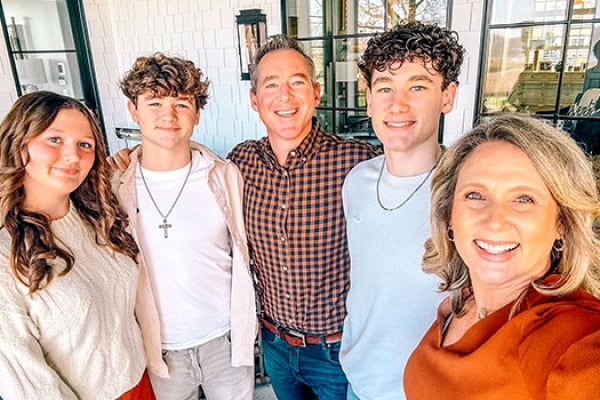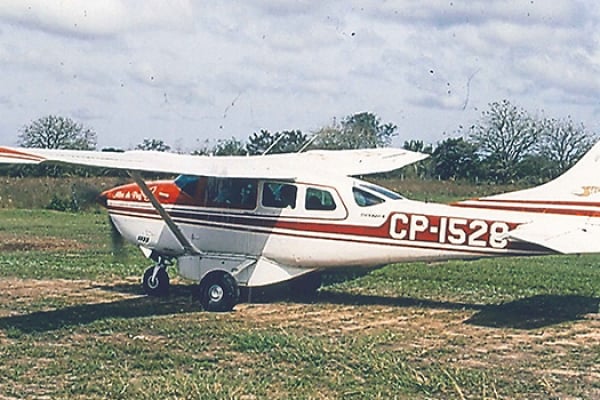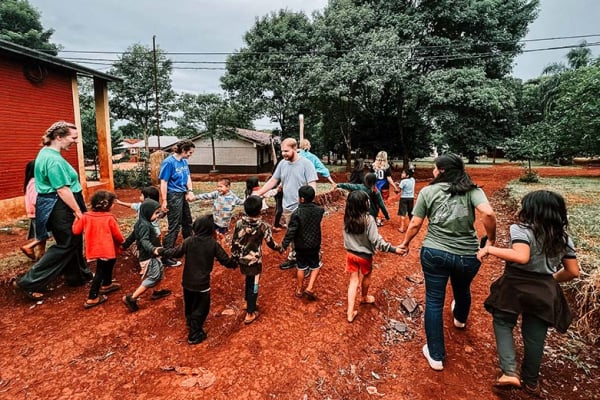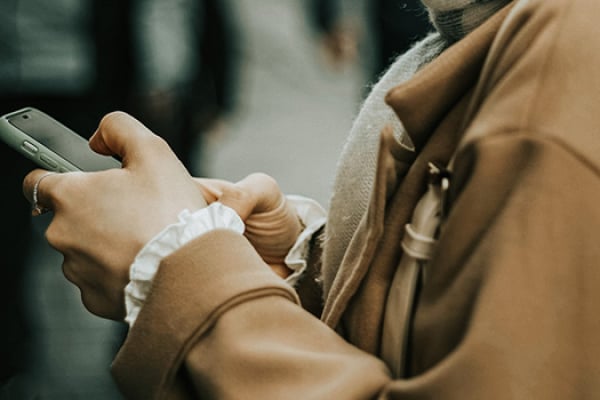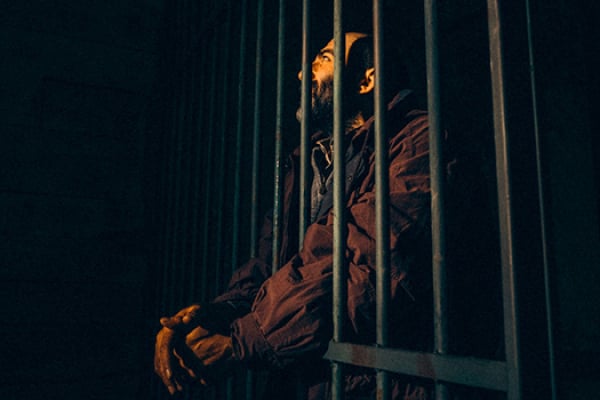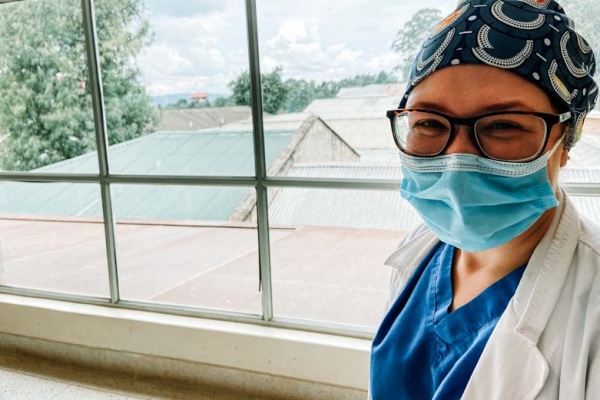
Journey with Others
MAY 23, 2022 | 5.5 MINUTE READ
KEVIN STARK, MISSIONARY IN KENYA
When you participate in global missions, you will inevitably step into a culture different from your own. Through language learning and getting acclimated to your new home, you’ll begin to notice different norms and behaviors. And—this is key—that’s okay. As missionaries, we’re not working toward changing cultural norms to be like our own.
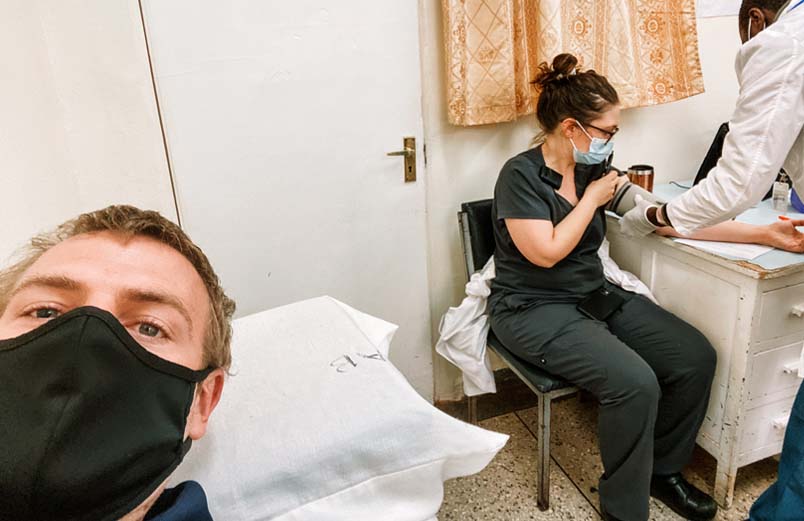
Kevin and Dr. Moselle Stark are missionaries in Africa.
The blog you’re about to read is from Kevin and Dr. Moselle Stark, missionaries in Africa. They’re going to walk you through what a medical experience is like in the United States and then compare that to what the same medical procedure or appointment would be like in Kenya. You can also watch the video to see firsthand what a day in the life of an OB/GYN doctor looks like.
But why tell you this story? Life looks different in Kenya than it does in the United States, and as you prepare to serve others, we find that it’s best to step into their shoes, to walk around in them for a while. And it’s through this that we will begin to form relationships that lead to Christ. Relationships like the one developed between Dr. Andrea Parker (WGM missionary) and Diana, which led to Diana encountering the love of God. Or like the relationship that created the desire in a young teenager to raise money for an elevator in Albania. We go not to bring our customs and cultural habits. We go to journey with others as they encounter the love and transforming power of God.
Across the world, typical hospital visits share some universal elements: the hustle and bustle of medical professionals, patients and visitors doing the hurry-up-and-wait dance, a steady choir of beeps accompanied by the frequent whoosh of beds being rolled down echoing hallways. Yet, there are many other components of a hospital experience that vary considerably from country to country. These variances are not the result of a hospital doing something “right” or “wrong,” but often reflect some of the cultural and structural characteristics of that country.
The differences between a typical patient experience in the USA vs. Kenya are many, but they certainly seem to parallel cultural differences between these nations. I have outlined a few interesting practical differences below. Take a look!
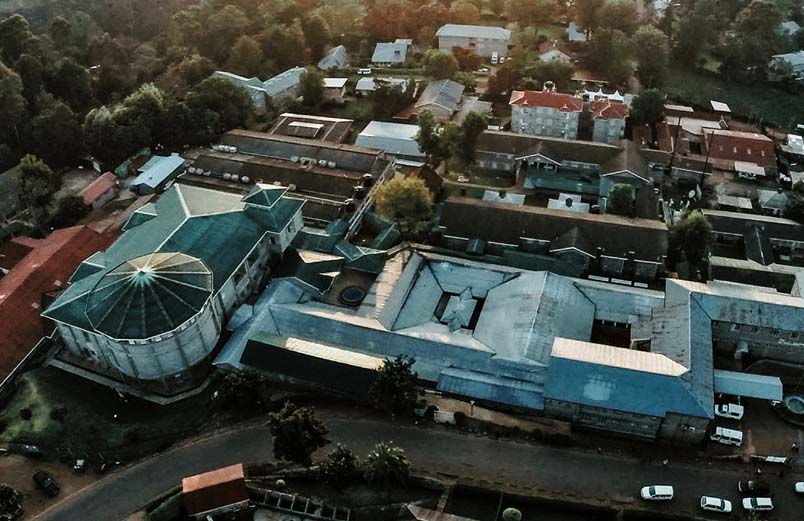
An aerial view Tenwek Hospital.
1. Hospital Experience/Culture
USA
There is a general expectation that a western hospital will not only treat a patient’s illness, but hospital staff will also provide for other needs such as food, laundry, bathing, assistance to use the restroom, etc. The more upscale a hospital is, the greater the amenities provided. Optimizing the patient experience is an important piece of hospital operation, influencing the reputation, and thus the success, of a hospital.
Patients also value and expect privacy, with solo rooms many times, or curtains to draw around a bed to isolate a person in a ward.
KENYA
Generally speaking, patients at Kenyan hospitals do not expect the hospital staff to attend to their non-medical needs. While Tenwek does provide food and the washing of linens and hospital garb, it is common practice for one or more family members to stay with the patient and attend to many of a patient’s other non-medical needs. This aspect of Kenyan family support system is challenged by the COVID requirements to have only one visitor with a negative test per patient.
The Kenyan hospital experience, consistent with national culture, is more communal than in a western hospital. Wards are open, and patients and family members often pass the time mingling with others. In the maternity ward, OB/GYN Dr. Moselle Stark often sees neighboring mothers assist each other in little ways, like looking after babies if a new mom has to go to the restroom.
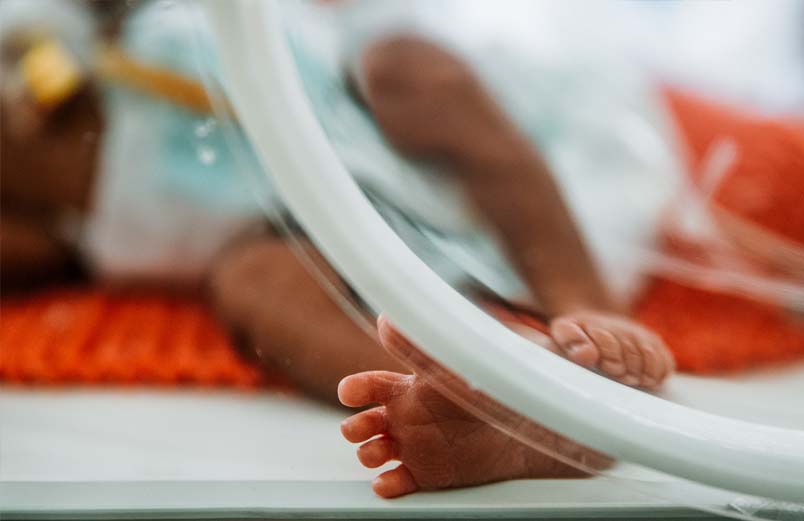
The delivery experience in Kenya is typically more communal than in the U.S.
2. What if people need blood?
USA
There is a large country-wide infrastructure of blood donation, purchasing, selling, etc., for the purpose of keeping the “blood bank” decently stocked for surgeries, emergencies, and the like. The hospital, other outside organizations, and businesses work this out.
KENYA
Because blood availability from the regional blood bank is inadequate, Tenwek Hospital oversees its own blood bank, primarily through requiring two to three family members of patients to donate blood before surgeries, even C-sections. This keeps the blood bank stocked, hopefully with the proper blood types needed for that very surgery. Family members and even other missionaries are called upon to donate blood as needed for complex surgeries.
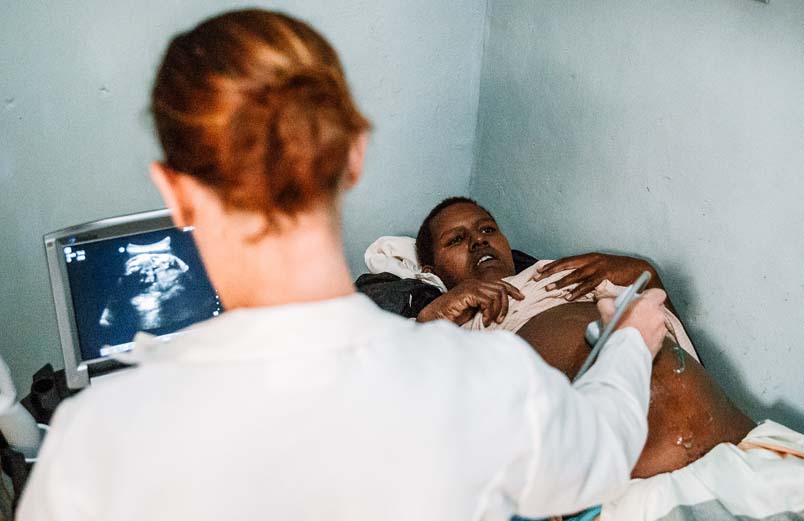
A doctor performs an ultrasound for a patient at Tenwek Hospital.
3. How do people pay for healthcare?
USA
Medicare, Medicaid, and insurance can cover some costs, if you are fortunate enough to qualify and/or have good coverage. Outside of insurance “copays,” typical payment for procedures, checkups, tests, etc. are usually charged to patients after the fact. Medical debt is quite common among Americans.
Individuals are expected to pay for their medical debt over time with payment plans, etc. This certainly causes problems for many American families. They will often seek the help of a few well-known individuals in their family, or potentially other government, religious, or community organizations, if the need is great. Still, nearly two-thirds of all bankruptcies in the U.S. are tied to medical issues/costs.
KENYA
National insurance exists for those whose employers pay for it, or who pay for it themselves. The National Hospital Insurance Fund (NHIF) covers some preventative care, outpatient care, and some tests, but most high-cost surgeries are covered by NHIF with such poor reimbursement than faith-based hospitals are forced to either deny care or take a huge loss. Inpatient hospital care is reimbursed a daily rate which really does not cover hospital expenses, and faith-based hospitals are forced to take the loss because charging the top-up expense to the patient is against the law.
There are not good structures in place to ensure that payment happens after a procedure. As a result, patients are typically required to pay for their elective procedures, tests, and care up-front. Healthcare professionals try not to turn people away for emergency treatment, but there is no clear-cut solution to guaranteeing that these patients pay afterwards. Tenwek is still working out a best way not to lose money over emergency procedures. One method is through the collection and use of departmental “compassion funds” in place to assist patients in moments of great need.
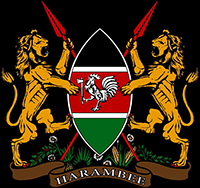
"Coat of arms of Kenya (Official)_1600-1506" by andjohmoe is marked with CC PDM 1.0
Often, individuals do not have emergency funds saved up to afford hospital surgeries or treatment on their own. Paying for these procedures is typically a family and community effort. A fundraising event, called a Harambee, is typically held with efforts made by relatives, neighbors, and friends in the weeks preceding the Harambee to collect funds to help reach the required goal. This community safety net is integral to the culture in the area surrounding Tenwek. Community members are expected to help others in their Harambee, and others will return the favor when a great moment of need hits.
NOTE #1 Harambee is Swahili, meaning “all pull together.” It is the official motto of the nation of Kenya. You can see it at the bottom of the Kenyan coat of arms.
NOTE #2: We are noticing that Kenya is becoming more urbanized and the culture is shifting towards individualism in the cities, it appears that the safety net available to families in rural areas such as Tenwek are disappearing. In places such as Kenya’s capital city of Nairobi, there are no structures in place for people to pay large medical bills.
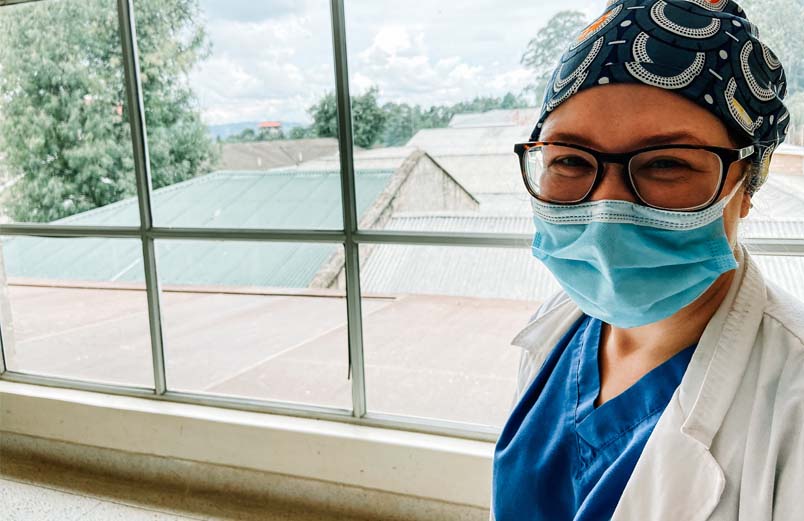
Dr. Moselle Stark serves her patients at Tenwek with joy.
Appendices: Extra tidbits for those who are curious.
A. Estimated costs for procedures:
VAGINAL DELIVERY
- Average U.S. cost (depending on the state): $5,000–$11,000
- Tenwek cost: $70–$150 (without epidural)
C-SECTION
- Average U.S. cost (depending on the state): $7,500–$14,500
- Tenwek cost: $150–$300
DIAGNOSIS AND TREATMENT OF A BROKEN ARM Diagnosis and treatment of broken arm
- Rough U.S. cost: $16,000 with surgery
- Tenwek cost: Surgery for a broken leg at Tenwek costs roughly $1,000, or 108,000 Kenyan shillings.
(Note: ~$5, or 500 shillings, a day is a nice wage for someone without a university degree in Kenya.)
B. Comparison of Leading Causes of Mortality in 2019
USA
- Cardiovascular diseases
- Cancer
- Chronic respiratory diseases (e.g., asthma and COPD)
- Neurological diseases
- Diabetes and kidney diseases
KENYA
- HIV/AIDS
- Cardiovascular diseases
- Respiratory infections and tuberculosis
- Cancer
- Diarrhea and enteric diseases
ACTION STEPS:
Pray: Maybe you’re preparing to serve as a missionary in another part of the world. Or maybe you’re serving in a ministry right in your hometown. Wherever God is calling you, you will encounter people different than you—be that their socioeconomic status, race, or education level. Ask God for humility when you step into these situations, so that you can set down your way of doing things and find God’s goodness of His creation in those you are serving. And ask Him through these newfound relationships to allow the Spirit to guide you as you seek to journey with others so they can journey with Jesus.
Give: You can partner financially with the Tenwek OB/GYN Residency program, which is training the next generation of Kenya doctors. Drs. Moselle Stark, Cheryl Cowles, and Meghan Murphy-Steen are actively training up the emerging OB/GYN residents to see a multiplication and continuation of new OB/GYN doctors in Kenya.
Author Bio: Kevin and Dr. Moselle Stark are WGM missionaries who serve in Kenya. Kevin desires to be an agent of connection and encouragement to faculty, residents, and families at Tenwek Hospital, while Moselle works as a OB/GYN doctor, serving patients at Tenwek and training the next generation of Kenyan OB/GYN doctors. The Starks have three young boys who keep them busy outside of work. Read their blog to learn more about their journey.

